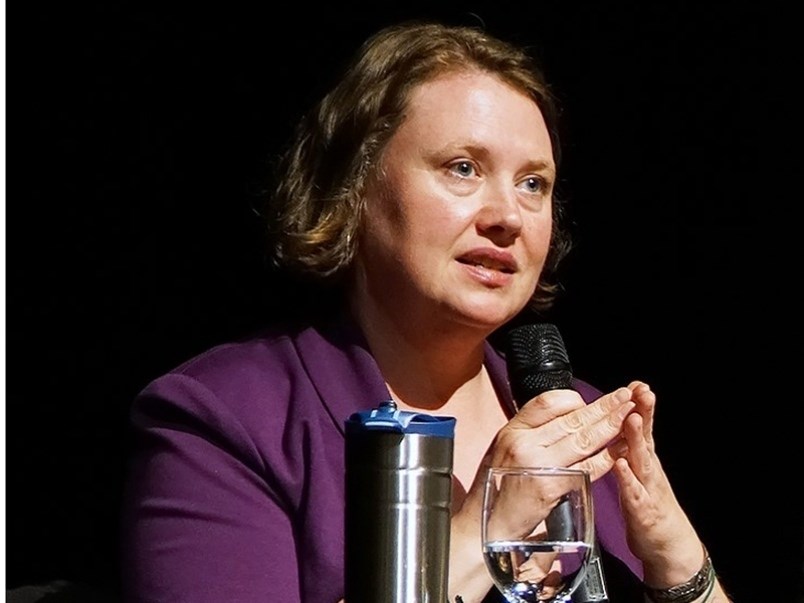Rachel Blaney, the NDP’s North Island-Powell River candidate and MP for the riding since 2015, says the timing of the early federal election is unfair on Canadians, but that she will be focused on presenting what she sees as her party’s bold measures to address both the climate and housing affordability crises.
“I think it’s very unfortunate timing,” said Blaney of the election. “COVID-19 has been hard on people … and as we see the numbers growing, we’re worried about what the fourth wave is going to look like.”
Blaney said she thinks prime minister Justin Trudeau’s government to date has “talked a lot of good things without any action” in terms of addressing climate change.
“We knew that of the G7 countries, Canada is the one that has seen our emissions go up,” said Blaney. “We have a prime minister who bought a pipeline and does not seem to have any real focus on having emissions targets that we’re actually going to meet.”
The NDP has at times worked with the Liberal minority government. Blaney said that Bill C-12, the Canadian Net-Zero Emissions Accountability Act, did not get to a stage that the New Democrats were completely happy with, but that her party pushed the government to legislate climate accountability more quickly.
“The bill originally was saying you have to wait till 2030 for Canadians to get reports about what was happening,” said Blaney. “The NDP got that down to 2025.”
This election, Blaney said her party is focused on hard climate-altering, greenhouse-gas emission reduction targets, and retrofitting homes and infrastructure buildings to be more energy-efficient.
“We also want to see a national crisis strategy that works with provinces, Indigenous communities, and really works on a plan to address the extreme weather that we’re seeing,” added Blaney.
The NDP is also promising to axe federal subsidies to the oil and gas sector, which totalled $18 billion in 2020.
“We need to stop that investment, and we need to take that money and start putting it into communities around addressing new plans for a green and more sustainable economy,” said Blaney.
However, the NDP’s credibility on climate has recently been questioned by environmental activists, who note that the BC NDP government gave the green light to LNG Canada, and is also allowing old-growth logging to continue in some regions.
Recently, scenes of the RCMP arresting old-growth forest defenders at Fairy Creek prompted condemnations from some NDP candidates. Regarding that incident, Blaney issued a statement, reading: “I stand with my NDP colleagues in calling for a truly independent civilian oversight of the RCMP and an investigation into actions there.”
“When we have such a polarizing situation, we need to make sure that sometimes we do bring in those civilian oversight practices, because it allows for a clearer process and safer outcomes in the long run for everybody,” Blaney told the Peak.
Asked if she would like to see the BC NDP government take a firmer stand on protecting old growth, Blaney said: “I think [the BC government does] have a fairly comprehensive report; I look forward to them fully implementing that report.”
NDP promises housing
Another major local issue has been the housing affordability crisis. In recent months, a spike in housing sales has resulted in some local landlords selling their rental properties and displacing low-income and working-class renters who then cannot find affordable places to rent.
Blaney said the Liberal government’s National Housing Strategy, first introduced in 2017, has been insufficient to alleviate the crisis.
“I respect that there’s some resources coming, but it’s just not enough,” said Blaney. “And that’s why I brought forward legislation on the right to housing to be added to our bill of rights; it’s so that we have some sort of accountability for that.”
The NDP is promising to build 500,000 affordable housing units across Canada over 10 years, a pledge that is identical to what the party offered in the 2019 federal election.
“We’ve also talked about having more support of up to $5,000 a year to help people mitigate rent, and we’re looking at how we’re going to make sure it’s more affordable,” said Blaney, adding that her party is also proposing a 20-per-cent foreign buyers’ tax on real estate.
Blaney believes the NDP has proven it can deliver meaningful changes during the last minority government.
“The NDP were the ones that pushed to even get a Canada Emergency Response Benefit (CERB),” she said. “If it wasn’t for the NDP, you know, the original plan was, we’ll have EI.
“The initial plan from the Liberals was $1,000 a month for CERB; we pushed to get it to $2,000. I think a lot of Canadians have seen that we’re able to push, that we really listened to what people needed.”
2021 North Island-Powell River riding federal election candidates:
Rachel Blaney (NDP)
Shelley Downey (Conservative)
Stacey Gastis (Maverick)
Jennifer Grenz (Liberal)
Paul Macnight (PPC)
Carla Neal (Marxist-Leninist)
Jessica Wegg (Green)





